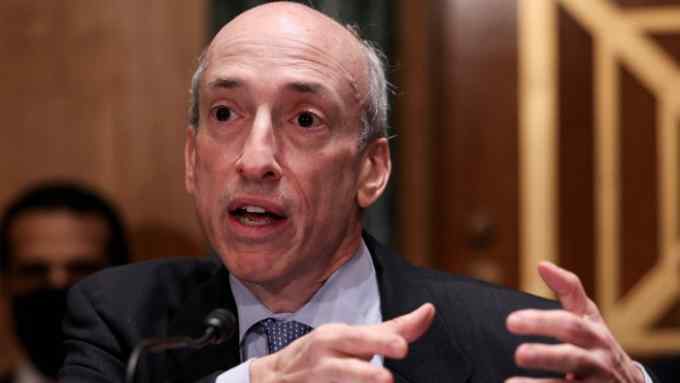Crypto exchanges’ multiple roles raise conflict worries

Simply sign up to the Cryptocurrencies myFT Digest -- delivered directly to your inbox.
Cryptocurrency trading platforms have a little secret: they masquerade as “exchanges” but, most of the time, they’re actually brokers.
In almost all respects, these digital assets exchanges are radically different from traditional stock bourses, despite having names that suggest they are replicas of the marketplaces that exist for equities and other securities.
In reality — and unlike conventional stock exchanges — trading platforms for Bitcoin and other digital assets do much more than just provide an electronic platform for investors to buy and sell securities. They provide safekeeping, handle client funds, act as a counterparty to trades, and — more recently — have started to lend and borrow.
And, according to Simon Forster and Duncan Trenholme, co-heads of digital assets at broker TP ICAP: “If you have an exchange that does custody, staking, lending and borrowing . . . it looks like a broker or a bank.”
This multi-faceted role has raised concerns that platforms may not always be serving the best interests of the customer. Rather than being a neutral party to transactions, like a stock exchange, a crypto platform can trade against customers, creating a situation where, for one side to win, the other must lose — meaning that retail clients are at risk of being treated unfairly.
Risks such as these have been identified in recent studies. In October, the National Bureau of Economic Research found that, unlike regulated exchanges, cryptocurrency platforms lacked provisions to ensure that investors receive the best possible price.
Anton Katz, chief executive of software company Talos, says that, for professional investors who are entering the market, this is a problem because some of them have “best execution” obligations — ie, they are required to transact at the best price they can.
As a result, they feel more comfortable spreading transactions across different providers, to minimise conflicts of interest and the scale of fallouts if a platform collapses or gets hacked.
“In crypto, most exchanges provide not only matching services but also custody, clearing and settlement to name a few,” Katz points out. “That means that, in reality, they look more like a [traditional] broker since a client is effectively facing off against the exchange itself on a trade, as opposed to another client of the exchange.”
And crypto exchanges do this with little, if any, regulatory supervision. Policymakers say that this is becoming a problem, given the ever-increasing financial and stability risks in a now $2tn market. Many are making concerted efforts to bring the mushrooming industry under oversight.
As the biggest holders of Bitcoin and other major digital assets, the exchanges are among the most influential actors in the crypto world, along with the “miners” who create new currency units.
They hold clients’ money and ask for traders to post money to finance trades upfront. They settle trades and make sure all parties are paid. But they do this in an environment where hacks are rife and transparency about prices, and what happens on the exchange, is almost zero.
Regulators have been aware of the problem for some years now. Ashley Alder, chief executive of Hong Kong’s Securities and Futures Commission, said in a 2018 speech that crypto exchanges can act as both agents for their clients as well their own self interest when trading — making it difficult to detect and monitor major conflicts of interest. He added that investors also face “additional vulnerabilities” because they trade with these platforms directly, not through an intermediary.
“These are activities of special interest to securities regulators as, superficially, these platforms seem to mimic conventional funds and stock exchanges,” Alder said. He also noted that the safekeeping of investors’ funds was an area of “key concern.”
Last year, Hong Kong’s regulator decided that all such platforms must register with them, spurring FTX and others to seek warmer regulatory climes in Caribbean islands.
Meanwhile, for the traditional exchanges, the vast sums amassed by crypto start-ups in a short time have made it difficult to resist digital assets as a potential market. They also hope that their background in regulated markets will give them an edge.
Jürg Schneider, head of media relations at SIX, the Swiss stock exchange operator, intimated as much when it won regulatory approval to launch a digital asset platform in September.
“We are a globally recognised and regulated securities exchange,” he said. “All of this constitutes a completely different construct from the crypto-trading exchanges that are currently on the market. They are not — from a regulatory standpoint — viewed as exchanges.”
But while cryptocurrency platforms face fewer challenges from regulators, they have other bothersome stakeholders to satisfy: retail clients.
“The reality [is] that unhappy customers are a few clicks away from transferring their assets to a competitor,” notes Fadi Aboualfa, head of research at London-based digital infrastructure provider Copper.
As regulation tightens and competition from established exchanges intensifies, investors’ ability to roam free could pose the biggest test for the digital start-ups.
Weekly newsletter
For the latest news and views on fintech from the FT’s network of correspondents around the world, sign up to our weekly newsletter #fintechFT

Comments